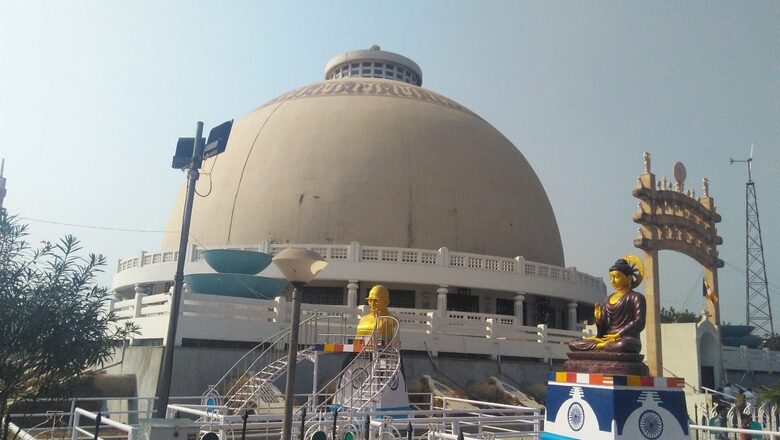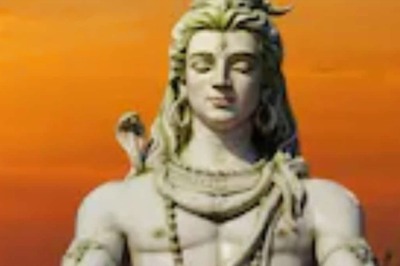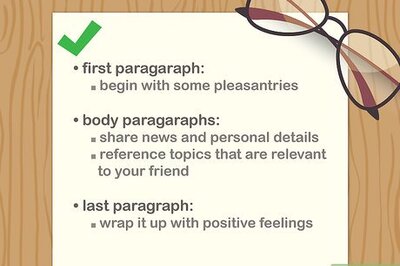
views
Dhammachakra Pravartan Din is a significant annual event in India. On October 14, 1956, the architect of the Indian constitution, Dr Bhimrao Ambedkar along with other followers embraced Buddhism after renouncing Hinduism at Deekshabhoomi in Nagpur, Maharashtra.
While Dhammachakra Pravartan Din and Dussehra are two different festivals, they are often celebrated together. This is because Dr Ambedkar chose to convert to Buddhism on Dussehra, which is a day that symbolizes victory over oppression and injustice. This year, it will be celebrated on Tuesday, October 24.
This Buddhist celebration stands as a testament to the monumental decision, when Dr. Ambedkar, along with an impressive assembly of around 365,000 fervent followers accepted the teachings of Buddhism. This conversion not only reshaped his own spiritual journey but also strengthened the Dalit movement in India.
Why Is Dhammachakra Pravartan Din Celebrated On Dussehra?
Dr. BR Ambedkar embraced Buddhism on Vijayadashami – October 14, 1956. Dhammachakra, or Wheel of the Law, is a symbol of Buddhism that represents the teachings of the Buddha. By celebrating Dhammachakra Pravartan Din on Dussehra, Ambedkarite Buddhists are also celebrating the spread of the Buddha’s teachings and the values that they represent.
Why Dr Ambedkar Selected Buddhism?
Dr Ambedkar had decided to leave Hinduism early on and studied other religions to understand which one would suit him better, and finally chose Buddhism. He chose ‘a morally sound religion’. Dr. Ambedkar had made 22 pledges on the day when he renounced Hinduism.
22 Vows of Dr Ambedkar
- I shall have no faith in Brahma, Vishnu, and Maheshwara, nor shall I worship them.
- I shall have no faith in Rama and Krishna, who are believed to be the incarnations of God, nor shall I worship them.
- I shall have no faith in Gauri, Ganapati, and other gods and goddesses of Hindus, nor shall I worship them.
- I do not believe in the incarnation of God.
- I do not and shall not believe that Lord Buddha was the incarnation of Vishnu.
- I shall not perform Shraddha, the Hindu ritual for the deceased.
- I shall not utter the sacred thread, nor shall I wear a thread around my neck.
- I shall not greet my Guru with the holy Guru Mantra.
- I shall not show my back to the Buddha, Dharma, and Sangha.
- I shall not participate in idol worship or engage in idol worship.
- I shall not visit or salute the Hindu temples.
- I shall not perform any rites and rituals of the Hindu religion.
- I shall not discriminate or promote discrimination on the grounds of caste.
- I shall treat all untouchables as equals and promote their welfare.
- I shall not consume alcohol.
- I shall lead an honest and chaste life.
- I shall not steal or engage in dishonest practices.
- I shall follow the Eightfold Path of Lord Buddha.
- I shall read and study the Buddha’s teachings.
- I shall follow the principles of liberty, equality, and fraternity.
- I shall not accept food or water from any Hindu who practices untouchability.
- I shall not accept any gifts or alms from Hindus who follow caste-based discrimination.
Dhammachakra Pravartan Din: History
The conversion of Dr Ambedkar from Hinduism to Buddhism was a well-considered choice. Driven by a desire to escape the clutches of the oppressive caste system deeply entrenched in Hinduism then, he decided to convert his religion. This bold step symbolised his quest for a liberated voice, free from the constraints imposed by the four-fold varna system within Hinduism.
Dhammachakra Pravartan Din: Significance
Dhammachakra Pravartan Din, a day of great historical significance, draws multitudes of Buddhists and admirers to the sacred grounds of Deekshabhoomi annually to commemorate this mass conversion to Buddhism. The event serves as a powerful reminder of the enduring legacy of Dr BR Ambedkar and the transformative impact of his spiritual journey.
It represents not only a spiritual awakening but it is also a significant milestone in the struggle for social justice and equality in India, making it an occasion of great reverence and reflection for each one of us.
Dr BR Ambedkar’s Quotes
- The future of India belongs to those who believe in the power of human reason and the dignity of the human person.
- The caste system is not a religious institution, it is a social institution.
- The only way to end caste is to educate the people about its evils.
- Women are the backbone of society. When women are educated and empowered, society will progress.
- Education is the key to social transformation.
- Religion is a personal matter. It should not be imposed on others.
- We are Indians, firstly and lastly.
















Comments
0 comment